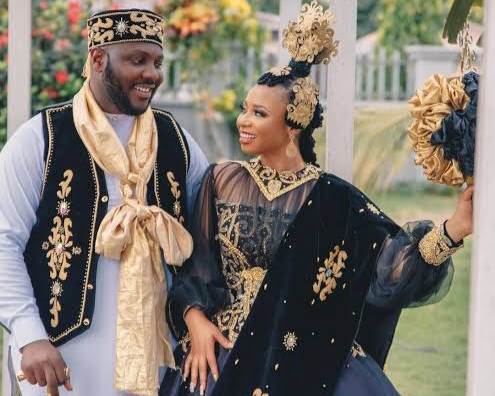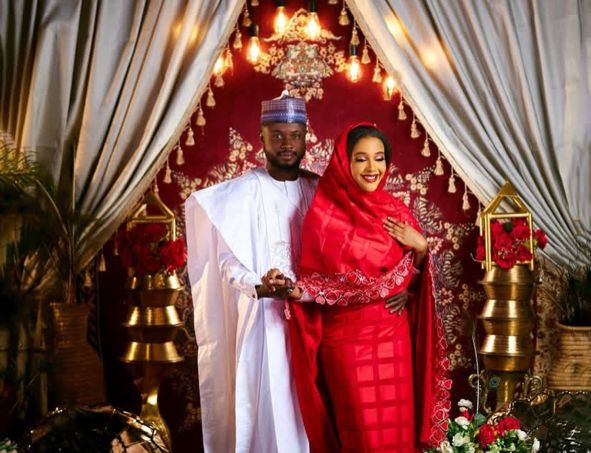Entertainment
Threads of Tradition: Exploring the Diverse Beauty of Nigerian Ethnic Weddings

Nigeria is home to over 250 ethnic groups, each with its own language, history, and rich cultural identity – and nowhere is this diversity more beautifully displayed than in traditional weddings.
From the colorful beadwork of the Ijaw to the regal agbadas of the Yoruba, wedding ceremonies across the country blend fashion, rituals, and family customs to create unforgettable experiences.
Despite their differences, these celebrations share one thing in common: a deep sense of identity, pride, and elegance.
Yoruba (Southwest: Lagos, Oyo, Osun, Ogun, Ondo, Ekiti)

Yoruba couple
Yoruba weddings are lively, stylish, and rich in culture. The bride often wears a heavily beaded iro and buba made from aso-oke, with matching gele (head wrap) and ipele (shoulder sash).
The groom appears in an embroidered agbada, filacap, and sometimes holds a cane as a sign of prestige. A standout feature is the formal introduction and engagementceremony where the groom’s family prostrates before the bride’s family. Even with modern trends, Yoruba weddings continue to embrace these traditions with new touches of glamour and luxury.
Hausa/Fulani (North West: Kano, Katsina, Sokoto, Bauchi, Jigawa, Kaduna, Zamfara, Gombe)

Hausa couple
Hausa weddings are modest yet elegant, deeply rooted in Islamic values. The ceremony, called fatihah, is often held at the mosque with minimal makeup or show. But pre-wedding events like Kamu (bride unveiling) and lefe (gift presentation) are colorful and fashion-forward, showcasing richly embroidered atamfa fabrics, flowing kaftans, and henna designs. Brides wear flowing gowns with turbans or veils, while grooms shine in babban riga and hula caps.
Igbo (Southeast: Abia, Anambra, Imo, Ebonyi, Enugu)

Williams Uchemba and wife
Igbo weddings are a bold celebration of wealth, family ties, and fashion. The bride often wears coral beads, a wrapper (George fabric), and a blouse with dramatic makeup and headpieces. Grooms wear Isi-agu (lion head) tops, often paired with red caps and walking sticks.
A central part of Igbo weddings is the bride’s entrance and wine-carrying ceremony, where she must find her groom and offer him a cup of wine. Today, Igbo weddings blend tradition with high-end fashion and decor inspired by Nollywood and social media.
Tiv (Middle Belt: Benue State)

TIV couple
The Tiv people are recognized by their signature black-and-white striped cloth called anger. Brides and grooms wear matching pieces, often sewn into modern gowns and senator-style outfits. Tiv weddings focus heavily on community celebration, with dancing, music, and symbolic gift-giving. Today, couples mix traditional anger with silk, lace, or tulle for a more fashionable touch.
Idoma (Benue State)

Idoma wedding. Photo credit: BellaNaija
Idoma weddings feature red and black traditional attire symbolizing power and identity. The bride may wear a red velvet gown wrapped in black fabric and adorned with beads, while the groom wears a coordinating George fabric outfit or agbada. Their dances, such as the Ojoche, remain a vibrant part of ceremonies.
Efik/Ibibio (Akwa Ibom & Cross River States)

Efik wedding. Photo credit: Planaday
Efik and Ibibio weddings are some of the most theatrical in Nigeria. The bride can appear in multiple outfits—one for each stage of the event. Popular styles include the onyonyo (long flowing dress) and usobo (blouse and wrapper), decorated with coral beads and elaborate hairdos. The groom may wear wrapper and shirt with a cap, staff, and velvet shoes. The weddings are dramatic, elegant, and full of grace.
Ijaw/Itsekiri/Urhobo (Niger Delta: Bayelsa, Rivers, Delta States)

Itsekiri couple. Photo credit: Rex Clarke Blog
The Ijaw and other Niger Delta tribes love flamboyance. Brides wear layers of coral beads, often costing hundreds of thousands of naira, and their wrappers are paired with blouses made from rich fabrics like damask or velvet. Men wear flowing white or cream senator tops or george wrappers, sometimes accessorized with bowler hats and canes. Drumming, praise-singing, and dancing bring the day alive.
Nupe (Niger & Kwara States)

Nupe Couple. Credit: Eucari Wears
The Nupe people have elegant wedding attire that blends Hausa modesty with their own vibrant colors and embroidery. Brides wear long-sleeved dresses with sequins or lace, while grooms wear full-length flowing gowns often with elaborate caps.
Gwari/Gbagyi (Abuja, Niger, Kaduna, Nasarawa)

Gbagyi couple. Credit: Rex Clarke
Gbagyi weddings are centered around community and blessings from elders. Brides wear colorful wrappers, beaded necklaces, and headscarves, while grooms dress in simple traditional kaftans. Their weddings often feature symbolic items like yam, calabashes, and raffia, representing peace and fertility.
Igala (Kogi State)

Igala couple: Instagram
The Igala people of Kogi State use bright fabrics, often pairing wrappers with simple blouses or long dresses. Traditional music and the presence of elders are essential. Their attire reflects influences from both the Igbo and northern cultures, creating a blend that’s unique to the region.
Other Notable Groups:* Ebira (Kogi) – Distinctive wrappers and blouse combos with bright accessories.
* Bajju & Atyap (Kaduna) – Beaded outfits and local woven fabrics.
* Jukun (Taraba) – Colorful ceremonies with layers of meaning.
* Bachama & Bura (Adamawa & Borno) – Fashion that reflects agricultural roots, often featuring earth tones and natural fibers.
Despite the vast differences in language, attire, and rituals, Nigerian weddings often follow a pattern of bride price payment, gift exchange, traditional rites, and a reception filled with music, dance, and food. What ties all these cultures together is the joy, elegance, and pride in heritage — expressed beautifully through fashion.
From North to South, East to West, Nigerian weddings are more than a union of couples — they’re a powerful reminder of identity, history, and the beauty that comes with diversity.


